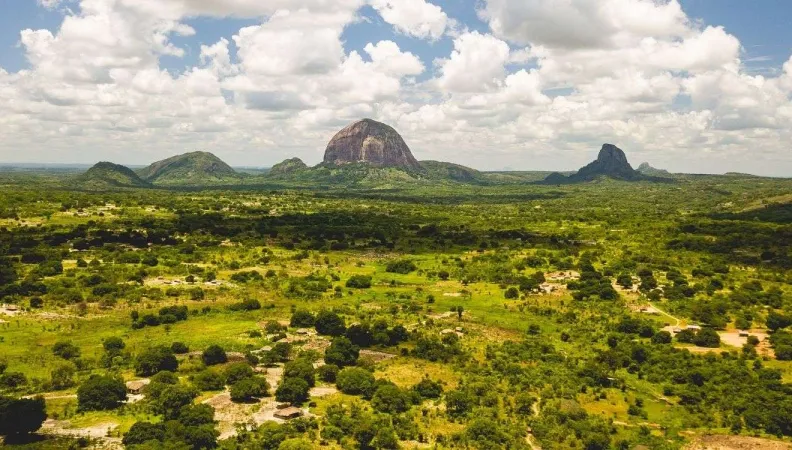Share the page
COMBO+: Stopping Net Biodiversity Loss in Six Countries in Africa and Asia
Published on

AFD and the The French Facility for Global Environment are supporting a new program launched by NGO the Wildlife Conservation Society and aiming to strike a better balance between economic development and the preservation of biodiversity. The signing of a partnership agreement between AFD and WCS last month extended their collaboration to cover a dozen topics of mutual interest.
The program to be funded by AFD and the French Facility for Global Environment from 2021 onward is unique. The ministries and competent authorities from six countries - Madagascar, Uganda, Guinea, Mozambique, Laos and Myanmar - will receive support in the process of devising and implementing public policies targeting no net biodiversity loss, and perhaps even net biodiversity gain, at a national level.
In order to achieve this, the Wildlife Conservation Society (WCS) NGO and its partners, who are in charge of running the Combo+ program, will help these countries manage both the social and environmental impact of planning and infrastructure projects more effectively. They will also help to enforce the ‘polluter pays principle’ in order to roll out environmental offset measures funded by developers and contracting authorities. The overarching objective is to strike a better balance between economic development and the protection of ecosystems, thus ensuring that each planning project - and the private sector as a whole - is able to contribute directly towards national biodiversity targets through the application of Avoid-Reduce-Offset.
A strict legislative framework, but one too rarely enforced
Creating and managing protected areas is currently a necessary but insufficient response to the global biodiversity extinction crisis. To limit the impact of extractive industries and large-scale projects, which are among the main causes of biodiversity destruction, most countries have introduced legislative frameworks forcing public or private actors to carry out environmental assessments for their projects. These include measures aimed at avoiding or reducing impact on ecosystems, or even, as a last resort, offsetting any residual impact from economic development projects.
The Combo+ program consists of conservation, the minimization of impact and biodiversity offsets. Its aim is to roll out this regulatory and institutional framework within these six countries, providing the technical and human resources necessary for ensuring it is enforced. “This project is our response to the challenges of cross-sector integration of biodiversity in the economies of countries where conservation is of vital importance,” says Aurélien Guingand, project manager at the AFD.
The program follows on from a first phase carried out between 2016 and 2020 in Madagascar, Uganda, Guinea and Mozambique. All four countries are home to remarkable biodiversity, but economic sectors with considerable environmental impact are very much on the rise. Phase 1 led to the adoption of new regulations surrounding the issue, initial support with institutional implementation and better sharing of biodiversity data collected in the field.
A €4 million grant from AFD and the FFEM
The second phase of the program is aimed at consolidating the political, institutional and scientific progress made in these countries, while extending the strategy to two new countries in Southeast Asia: Laos and Myanmar. For these countries, the goal will be to identify at-risk areas where large-scale projects should be avoided, and those where offset measures could be implemented, whether through restoration or conservation. A number of solutions aimed at reducing the impact of infrastructure have already been discussed, in addition to the implementation of biodiversity offsetting initiatives, such as the funding of protected areas or the restoration of certain at-risk habitats.
The funding agreement for this program was signed on June 28, 2021 by AFD’s Chief Executive Officer Rémy Rioux, in the presence of the FFEM's Secretary General Stéphanie Bouziges-Eschmann and WCS CEO Cristián Samper. AFD and the FFEM will each be contributing around €2 million out of a total budget of €10 million. “This project is very much in keeping with the FFEM’s mandate for innovation in that it is aimed at institutionalizing the hierarchy of biodiversity offsetting in public policy, implementing it in a participatory way, scaling up and sharing good practices at an international level”, explains Stéphanie Bouziges-Eschmann.
A global partnership between AFD and WCS
This project is part of a wide-ranging partnership with WCS, which was signed on the same date. Its aim is to capitalize on twenty years of collaboration between the institutions and to work together in advance of key deadlines on the international agenda regarding biodiversity and the climate. This partnership will focus primarily on innovative funding mechanisms for conservation, such as Avoid-Reduce-Offset, in addition to supporting protected areas, tackling poaching, ways of merging climate/biodiversity into development projects and policies and the One Health approach.
“Like the 2015 Paris Agreement, which enshrined the role of climate finance in the fight against climate change, we must now amplify biodiversity finance mechanisms in line with the ambitions of the post-2020 framework under construction. In this regard, the world's 500 public development banks - which are responsible for more than 10 percent of investments worldwide each year - can play a key role. It is the spirit of this partnership between the Wildlife Conservation Society and AFD that will help mobilize those involved in protecting biodiversity in Africa and Asia, as was called for by President Macron during the last edition of the One Planet Summit,” says Rémy Rioux.
This is a view shared by Cristián Samper. He stressed “the trigger effect of the Covid crisis at a global level, encouraging us to come to terms with the interdependence between the three crises currently facing the world: biodiversity destruction, climate change and pandemics, which often share the same causes and solutions, and on which WCS is delighted to be working with AFD in the context of this renewed partnership.”
